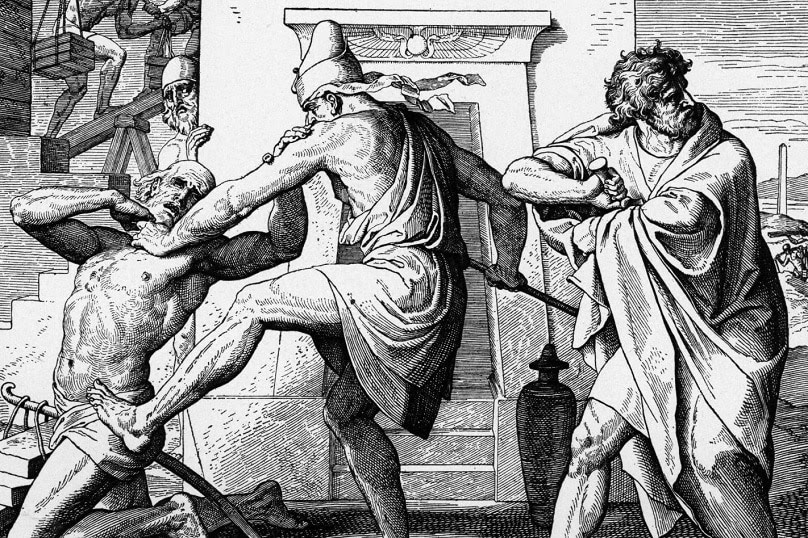
Moses flees to Midian
In Exodus, the passage (Exodus 2:10-15) reveals the events that marked the end of Moses’ 40 years in the Egyptian palace and the beginning of his 40 years in the wilderness. Interestingly, while the text omits the 40 years in the palace (between verses 10 and 11), it provides relative detail about the events leading up to Moses’ time in the wilderness of Midian, spanning verses 11 to 15. This deliberate focus underscores the importance of the event that prompted Moses to leave behind his comfortable life in the Egyptian palace and receive training to become the leader of the Exodus through the Midianite wilderness.
Killing an Egyptian
After being raised as a prince in the royal palace, Moses reached adulthood and witnessed an Egyptian mistreating a Hebrew man, which led to him taking the Egyptian’s life. Moses’ actions were motivated by a sense of nationalism and suspicion rather than personal connection with either party involved. It’s possible that his anger was intensified by the severe oppression the Hebrews were enduring under Egyptian slavery at that time.
Hebrews fighting each other
The following day, Moses encountered Hebrews engaged in a conflict, and he admonished them for fighting among themselves. It was deeply disheartening for Moses to witness the suffering of his fellow Hebrews at the hands of the Egyptians, and seeing them turn against each other added to his anguish. Despite his efforts to advocate for the rights of the oppressed, Moses faced distrust and was accused of taking matters into his own hands by killing an Egyptian without being called upon to do so. This accusation, though valid, compelled Moses to flee from the palace.
Meeting Reuel in Midian
The land of Midian, located on the eastern shore of the Gulf of Aqaba, was inhabited by the descendants of Midian, the fourth son of Abraham and Gedurah. Although the exact boundaries of Midian are challenging to determine due to the nomadic nature of its people, it was in this region that Moses encountered Reuel, also known as Jethro, a Midianite priest. Reuel served as a priest to the pagan gods worshipped by the Midianites, and Moses found employment and lodging with him during his time in Midian.
Marrying Reuel’s daughter
When Reuel, also known as Jethro, saw Moses face to face, he was drawn to him for his natural observance and dignified demeanor as an Egyptian royalty (Exodus 2:2). Impressed by Moses, Reuel offered him his daughter in marriage, and Moses accepted. Zipporah, meaning “little bird,” became Moses’ wife, a surprising and divinely ordained match. Zipporah’s devotion was evident when she circumcised her children and threw a sheepskin at Moses’ feet to avert God’s anger (Exodus 4:24-26), and later, when she returned to Midian to support Moses’ work of deliverance but rejoined him when he led the people out of the wilderness at Sinai (Exodus 18:1-5).
Gershom the son
Moses named his son Gershom, meaning “stranger” or “foreigner,” which indicated his identification as a Hebrew and a child of Israel rather than assimilating into Midian, despite having a wife and son from there. This sense of being a “stranger” reflects his steadfast “national consciousness” and played a significant role in his selection as the leader to deliver Israel from Egypt and lead them into Canaan. Moses’ commitment to his Hebrew identity and his refusal to fully embrace Midian as his homeland exemplify his qualification and dedication to fulfill his divine mission.
Reflections
Moses’ zealous love for his people, as seen in his actions, is a virtue that resonates with Christians. Just as God used Moses, who had a passionate love for his people, to save Israel, God delights in using devoted saints who possess a deep love for their own people to bring salvation to the nations (Exodus 2:11-12). Additionally, Moses’ marriage to Zipporah, the daughter of a Midianite priest, highlights the inclusiveness of salvation even in the Old Testament era, demonstrating that the door of salvation has always been open to Gentiles. It serves as a reminder that salvation is by grace through faith, not by lineage or ancestry, and that as believers, our true home is not of this world but in the eternal presence of God (Acts 7:29, Hebrews 11:1).
